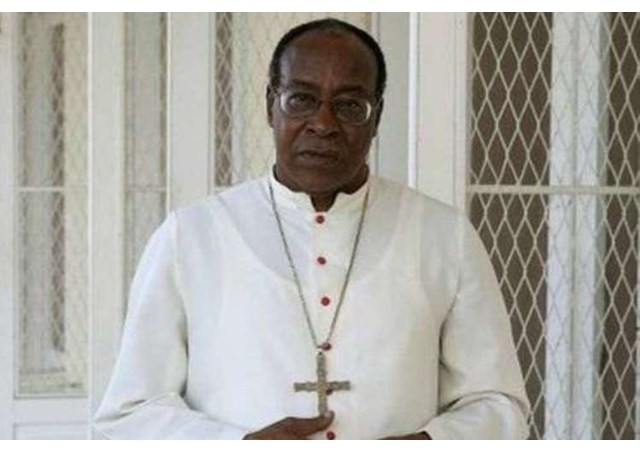
Mozambique mourns Archbishop Emeritus, Jaime

Amidst renewed political tensions in Mozambique, the Archbishop Emeritus of Beira, Jaime Pedro Gonçalves will be laid to rest this Saturday.
Archbishop Jaime, a towering Church and national figure in the history of Mozambique was the Chief negotiator representing the Mozambican Church at talks that led to a political settlement now known as the Rome 1992 Comprehensive Peace Agreement. It was signed by the then warring parties of Renamo and Frelimo.
The Archdiocese of Beira in Mozambique confirmed 9 April as the burial date, to Radio Vatican’s Portuguese Service. Archbishop Jaime died Wednesday this week, at a clinic in Beira, after a long illness. He was admitted to the hospital last Sunday.
The Archbishop was 79.
In a 4 July 2012 wide-ranging interview with Vatican Radio, Archbishop Jaime spoke about the various stages of his life in the Church; in Mozambique and Africa. He talked about resting now that he was no longer Archbishop of Beira.
"The retired experience is characterised mainly by rest since one is after all in retirement,” Archbishop Jaime told Vatican Radio at the time. He added, “Without the concerns of the office, I initially found life in retirement disconcerting. For 35 years I was the head of the diocese and then the archdiocese. I had responsibilities in the Episcopal Conference of Mozambique; was president of the conference for more than ten years; I had responsibilities at the Inter-Regional Meeting of the Bishops of Southern Africa –IMBISA, where I was president for nine years. While still in the IMBISA executive, I became second vice president of SECAM, the Symposium of Episcopal Conferences of Africa and Madagscar based in Ghana. All these responsibilities involved a lot of travel on my part. Many were my exists from the diocese and the country for meetings and engagements. Then later there was the peace process with which we were involved. At some stage, we did not even know where to hold [the peace process meetings], and we ended up going to Rome where the Comprehensive Peace Agreement was signed. Now I'm trying to rest,” the Archbishop Emeritus said at the time.
Archbishop Jaime has died at a time when the Comprehensive Peace Agreement signed by Frelimo and Renamo is under threat of collapse. In recent weeks and months, Renamo and Frelimo have been in a state of political tension, and there are fears of renewed fighting.
As fears of renewed fighting have grown, the United Nations High Commission for Refugees reported that some Mozambicans were fleeing into neighbouring Malawi. Reliefweb says over 11,500 Mozambican refugees have entered Malawi since mid-December 2015. For their part, Renamo and Frelimo have been trading accusations. Earlier this year, Manuel Bissopo, Renamo’ secretary general was severely injured while his bodyguard was killed in a drive-by shooting in Beira.
Renamo feels politically marginalised and dissatisfied with economic disparities between Frelimo and Renamo strongholds. In 2014, former Mozambican president, Armando Guebuza and Renamo leader, Alfonso Dhlakama signed a ceasefire agreement that allowed for the October 2014 elections. The elections, disputed by Renamo, were won by Frelimo’s candidate, Filipe Nyusi, who is now Mozambique’s current President.
There is no appetite for war in Mozambique. The post-independence civil war (1977 -1992) was bitter and protracted. One million people died in the fighting, some from starvation while thousands were injured or maimed by land mines. Five million, mostly rural citizens, were displaced by the war.
There is also so much at stake in economic terms. Major gas reserves have been discovered off the coast of Mozambique and large multinational companies have been drilling in the area since 2010.
The influential London-based think tank, Chatham House notes that reconciliation in Mozambique is not an option. High hopes are riding on Mozambique’s relatively new President, Felipe Nyusi. He is seen as more conciliatory than his predecessor, Guebuza. Reports Chatham House, “Under the Nyusi government, there is a new imperative to address processes of reconciliation and disarmament, and its efforts should be warmly supported by the international community.” Part of the reconciliation process should include enabling Renamo’s war veterans access to state pensions. At the moment, most of Renamo’s veterans feel most disadvantaged and discriminated against by the Frelimo government.
The 1992 Rome Agreement is a sign of what is possible when there is the political will to work for peace.
Archbishop Jaime has left Mozambicans a legacy of peace. He distinguished himself as one of its tireless defenders and advocates. He is known to have chided both Frelimo and Renamo for not complying, in full, with the terms of the 1992 agreement.
Born in Nova Sofala on 26 November 1938, Archbishop Emeritus Jaime Pedro Gonçalves retired from the pastoral governance of the diocese in January 2012. Archbishop Claudio Dalla Zuanna, an Argentine-born Italian succeeded him.
Archbishop Jaime will also be remembered as a prolific author who wrote extensively about peace and other subjects.
When the then Marxist-leaning independence government of Samora Machel nationalised Church institutions, it was Archbishop Jaime who later went about recovering them from the state, on behalf of the Church.
The Archbishop is also credited with moving the Mozambican Conference of Bishops towards the founding of ‘Universidade Católica de Moçambique’ (UCM), the Catholic University of Mozambique in Beira. He was its first Chancellor. Announcing the death of Archbishop Jaime, Universidade Católica de Moçambique spoke of profound sorrow on the passing away of, “Dom Jaime Pedro Gonçalves, Arcebispo Emérito da Beira e primeiro Magno Chanceler da UCM.”
(Fr. Paul Samasumo, Vatican Radio)
Email: engafrica@vatiradio.va
| All the contents on this site are copyrighted ©. |


